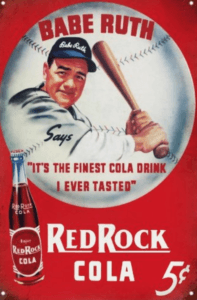
By Mark Schaefer
Last week I wrote a post about how your price communicates a message about your brand. This prompted a lively discussion online about the importance of quality in this equation. Many chimed in that if your quality does not live up to the price expectation, you’ll fail.
This makes good sense … but it’s not always true. There are plenty of examples where quality has little or no impact on a purchase decision or the price that is paid.
In fact, you could say the difference between a raw market value and the actual achieved price is the impact of marketing.
Here are some examples where quality is not necessarily part of the price consideration.
1. It’s a great story
In my living room I have a beat up green table.
It’s a little rickety, has paint stains on it, and the drawer doesn’t work very well. By any standard, this is not a high quality piece of furniture you should have on display in your home. If you saw it at a yard sale you would probably pass it by. Yet I paid a couple hundred dollars for the thing and it’s my favorite piece of furniture in the whole house.
Why?
I buy stories.
Almost everything in my house has a story behind it. It’s not just a vase or a panting or a lamp … it’s a story I can tell a visitor.
This table has a story behind it. It’s an authentic piece of hand-crafted primitive furniture from a farm near my home. You can see the years of family projects in its nicks and bumps and stains. The thing is alive with personality.
And, the quality sucks compared to anything you would buy in a furniture store. But I just like it.
Creating a story behind the brand is a very important part of marketing.
2. Sentiment
 When I was a kid I fell in love with an album by Jethro Tull called Songs From The Wood
When I was a kid I fell in love with an album by Jethro Tull called Songs From The Wood. It was an extraordinarily complex record blending rock, folk, classical, and jazz — sometimes in the same song! For me, it stood out as bold and experimental. I wore the thing out.
And of course I began to explore the band’s other albums. Their early stuff was awesome. And so I continued to buy every record they made because I fell in love with the band. They became part of my life story.
I bought their records even when they sucked. And boy did some of them suck. Years and years of suck in fact. I suppose in this case I was buying “hope!”
It was irrational for me to buy poor quality products year after year. But consumers are not rational. They are emotional. And emotion means money.
Maybe Star Wars or Elvis or Power Rangers connect to you in an emotional way? Everybody has something that they love — and buy — for irrational reasons.
3. Scarcity
Do you remember that Beanie Baby craze?
 In particular, there was the famous, limited edition purple Princess Diana bear. On October 29, 1997, the Ty Company released the famous bear and created a collector frenzy.
In particular, there was the famous, limited edition purple Princess Diana bear. On October 29, 1997, the Ty Company released the famous bear and created a collector frenzy.
Collectors swooped them up, anticipating that they would be worth hundreds of thousands of dollars one day.
Now let’s level set here for a moment. This bear probably cost less than 50 cents to produce. A fair market price with retail mark-up might be $2.50. Yet the bears were trading at one point for thousands of dollars. Toy lovers thought the scarcity would translate into long-term riches.
Clearly, people were buying something other than the quality of the bear!
Alas, the Beanie frenzy subsided. A Princess bear recently sold for $1 on eBay!
4. Celebrity
 Kim Kardashian sells every sort of skin care product imaginable. Are the products any good?
Kim Kardashian sells every sort of skin care product imaginable. Are the products any good?
Quality is probably a secondary consideration in this purchase. Kim Kardashian is a celebrity, and in our society, celebrities equal authority, whether deserved or not.
Lady Gaga just launched a beauty line. An article said:
To judge from the first commercial, the brand will have all the glitter and gloss we’d hope for from Lady Gaga. It’s got attitude too. “The last thing the world needs is another beauty brand,” the commercial’s voiceover says. “But that’s too baaaad.”
There is no mention in here about quality or even product benefits. It’s about glitter and attitude, which what her fans expect! And, they’ll but the stuff.
Helping people aspire to be a celebrity through the products they use has been one of the oldest marketing tactics in the books. In the early 1900s film star Charlie Chaplin was one of the first to take money to endorse products. Baseball slugger Babe Ruth made more money hawking cigarettes, soda, and hotdogs than playing baseball.
We love these stars and by association, we love the products they sell, regardless of price.
To achieve a high price, you don’t always need high quality if you have a Kardashian in your corner.
5. Habit
There has been a lot written lately about the importance of consumer habit.

A Chevy tattoo
Essentially, the research shows that many consumers are lazy. If you can become part of the habit of their lives, it can be hard to unseat those traditional products, even if you have better quality or higher value.
A great example is trucks. In America, there are two great camps — The Ford camp and the Chevy camp.
For a die-hard Chevy fan, it probably doesn’t matter how many quality awards Ford wins. They are Chevy people, perhaps over generations. The brand has become part of their life routine and they could not imagine a change.
I heard one owner who was experiencing quality problems with their truck comment, “I’d rather bitch than switch.” Exactly.
To a lesser degree, people may reach for the same breakfast cereal or carpet cleaner because that is what they have always used. Why switch?
To achieve a high price, you don’t always need high quality
The main theme I want to emphasize today is that sure, quality matters. Price matters. But there are A LOT of things that can potentially matter to customers.
That’s what makes marketing so endlessly fun and fascinating — the combination of psychology, sociology, and anthropology that brings a product to life!
Don’t get too focused on any one thing like social media or content marketing. You’ll miss the bigger picture of how marketing really works in the world.
 Mark Schaefer is the chief blogger for this site, executive director of Schaefer Marketing Solutions, and the author of several best-selling digital marketing books. He is an acclaimed keynote speaker, college educator, and business consultant. The Marketing Companion podcast is among the top business podcasts in the world. Contact Mark to have him speak to your company event or conference soon.
Mark Schaefer is the chief blogger for this site, executive director of Schaefer Marketing Solutions, and the author of several best-selling digital marketing books. He is an acclaimed keynote speaker, college educator, and business consultant. The Marketing Companion podcast is among the top business podcasts in the world. Contact Mark to have him speak to your company event or conference soon.
Top illustration courtesy Unsplash.com
Other images marked safe for re-use by Google search.
Some links are affiliate links


